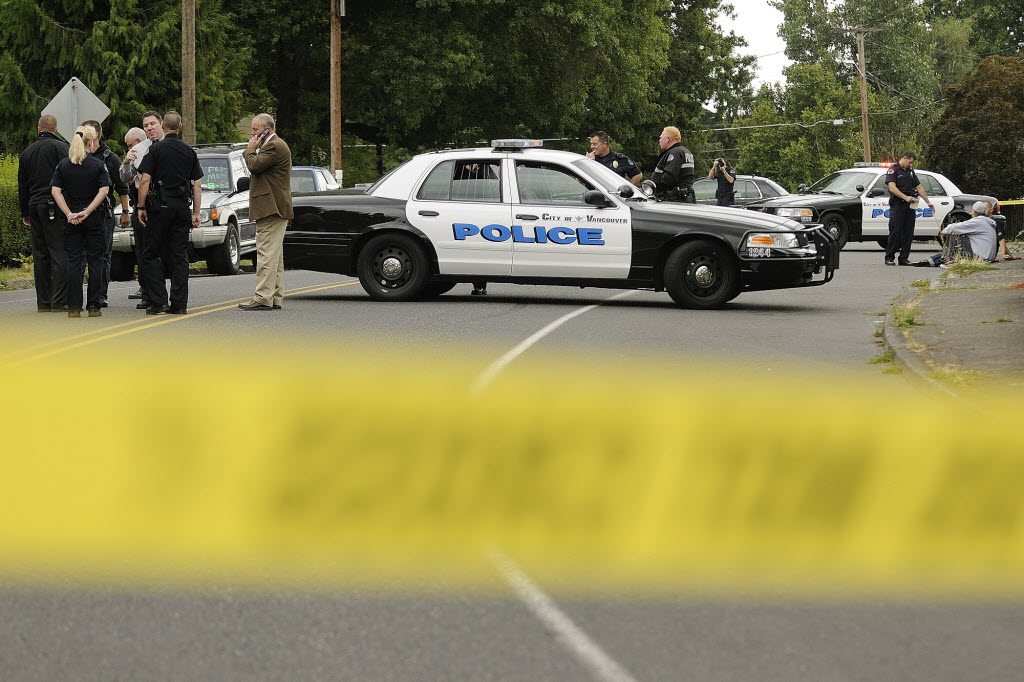New funding for the Vancouver Police Department took one step back Monday night.
At the recommendation of Vancouver Strong — an advisory group tasked with developing a sustainable funding plan for the city — the city council was considering a two-pronged plan to bring in $6.1 million in annual revenue to help fund police services. But after strong protests by local nonprofits, the city will take yet another look at the proposal.
Without a replacement funding plan, an alternative funding mechanism is set to go into effect Jan. 1, 2019. The surcharge would tax businesses per square foot and landlords per multifamily unit.
The Vancouver Strong proposal would increase the utility tax 2.2 percentage points in 2019 and 1.8 percentage points in 2020. The increases would bring in an additional $2.39 million and $2 million, respectively. The utility tax is currently 24.9 percent.
The second prong of the group’s plan would expand the city’s $90-per-employee business license surcharge. The cap on companies with more than 400 full-time employees would be removed, impacting approximately 11 employers with 9,685 employees total. The change would raise $560,000. This proposal would come with a two-year phase-in period. In 2019, the cap would be 799 full-time employees. In 2020, the cap would be removed entirely.
To make up for the lost revenue in 2019 by phasing in the change, the city would use a combination of undesignated general fund money and savings from existing vacancies in the VPD. The lost revenue is estimated to be $700,000.
Vancouver Strong also proposed applying the business license surcharge to nonprofit organizations with four or more employees. The expansion would add $900,000 in revenue from 123 organizations. This is where the council ran into trouble.
After obtaining feedback from more than 200 nonprofits, city staff initially amended the proposal to seek the fee from nonprofits with 20 or more employees only.
“The city has never before enjoyed such a wide response to any of its surveys,” said Chief Financial Officer Natasha Ramras.
The modified proposal would impact 27 nonprofits and generate $650,000 annually “minimizing the impact on the smaller nonprofit sector while capturing a significant majority of the revenue contemplated by including the nonprofit sector as a whole,” according to a staff report.
The fee would also benefit from a two-year phase-in. Organizations that operate exclusively as places of worship are exempt.
Strong criticism
The proposal was met with sharp criticism from the nonprofit community at Monday’s meeting.
Brittini Allen, who represents YWCA Clark County, said the fee as proposed would cost the organization about $6,000 a year, which put it in a slightly better situation than larger groups. But $6,000 is 75 percent of the group’s budget for Court Appointed Special Advocates to visit foster children in their foster homes, schools, and on visits with their biological parents. To look at it another way, $6,000 helped six families who escaped domestic violence find a safe and stable home, she said.
“Could you imagine having to decide which program to cut from? Having to decide who you cannot help?” Allen asked. “Who should we not help?”
Several other nonprofits shared similar stories of detrimental impacts as a result of the fee.
Craig Pridemore, chief executive officer of Columbia River Mental Health Services, said his organization wouldn’t have to cut services, but he called the fee “ill considered.” He asked the council to remove the provision before approving the funding plan.
“If not, I’ll be back — and respectfully, I won’t be alone,” Pridemore said.
Ultimately, the council opted to send the proposal back to city staff rather than move forward with a public hearing scheduled for Sept. 10.
The council asked staff to consider a medley of options, including phasing in the fee levied on nonprofits and increasing the utility tax to remove the fee on nonprofits altogether.
To make up for the nonprofits’ portion of revenue, Ramras said the utility tax would need to increase another 0.6 percent, or an average of $2 per residential customer.
“To just push everything to utility tax just because it’s easier because we’re feeling political pressure, that to me is not the best thing to do,” said Councilor Alishia Topper.
As an executive director of a nonprofit herself, Councilor Linda Glover said the council is elected to make difficult decisions and balance the needs of the community.
“There’s a lot of essential parts we’re trying to find a balance to,” she said.
As the city extends its consideration of the funding plan, Mayor Anne McEnerny-Ogle asked nonprofits to continue reaching out.
“We’re not allowed to go ask the state who you are, how many employees you have, so if you could please continue to send us information as to what this means to your nonprofit, we would appreciate it,” McEnerny-Ogle said. “Our hands are tied a little bit there.”
The council will review the proposal once again at an unknown date, but as City Manager Eric Holmes noted, the clock is ticking.




